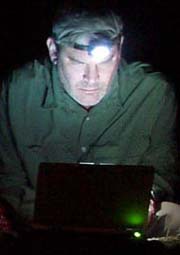Camping during the dry season
December 30, 2004
Moraka Beach, Equatorial Guinea
N 3.25878° E 8.48594 ° Elevation 8 feet. Temp: 81° F
Our group settled into a routine today at this gritty camp on the remote southern shore of Bioko island.
The expedition from Arcadia Univeristy has set up its beach camp among a small clearing in this seemingly endless forest of palms and broadleaf trees. My wife, Amy Blackstone, and I stayed fairly dry in our tent last night, when it seemed to rain pretty much nonstop. A few other campers did not fair so well. One lad from Wichita woke up with a couple of inches of rain gathered at his end of the tent. He’s not in Kansas anymore.
The Arcadia professors leading the group, Gail W. Hearn and Wayne A. Morra, assigned the 24 members of the expedition to various tasks this morning. Three groups went off on established census trails to count wildlife. Most came back very excited to have seen animals -- there were quite a few sightings of red colobus monkeys and some guenons. Inquirer Photographer Barbara Johnston even caught sight of a drill – the endangered primate that is the central focus of the expedition’s survey. Alas, the drill did not remain stationary long enough for Barbara to get off a shot. Wildlife photography, especially in a rainforest, makes sports photography seem easy.
In the next few days we’ll ask Barbara to offer up an account on this blog about the challenges she is facing.
I spent the morning getting our satellite telephone gear up and running and to work out some kinks in our power supply. The rain paused throughout much of the day, allowing us to do a little laundry in a creek – the fine, black volcanic sand of the beach seems to work its way into every crevice of equipment and clothing. Late in the afternoon, dark, thunderous clouds moved in from the south, blowing over several of tents that are staked down in the sandy soil. The temperature, which had peaked at midday at 92, cooled down rapidly. Those remaining in the camp scurried around, restaking tents and tying lines to trees to keep them from uprooting. Then the rain settled in again for an hour or so.
And this is supposed to be the dry season in Equatorial Guinea.
I’m making arrangements to go out this evening with some of the guards who patrol the beaches here to discourage turtle poaching – the Bioko project has hired a few dozen locals to protect the sea turtles that nest here this time of year. We hope to put together a story on their work for the newspaper in the coming days.
If the weather holds.
Moraka Beach, Equatorial Guinea
N 3.25878° E 8.48594 ° Elevation 8 feet. Temp: 81° F
Our group settled into a routine today at this gritty camp on the remote southern shore of Bioko island.
The expedition from Arcadia Univeristy has set up its beach camp among a small clearing in this seemingly endless forest of palms and broadleaf trees. My wife, Amy Blackstone, and I stayed fairly dry in our tent last night, when it seemed to rain pretty much nonstop. A few other campers did not fair so well. One lad from Wichita woke up with a couple of inches of rain gathered at his end of the tent. He’s not in Kansas anymore.
The Arcadia professors leading the group, Gail W. Hearn and Wayne A. Morra, assigned the 24 members of the expedition to various tasks this morning. Three groups went off on established census trails to count wildlife. Most came back very excited to have seen animals -- there were quite a few sightings of red colobus monkeys and some guenons. Inquirer Photographer Barbara Johnston even caught sight of a drill – the endangered primate that is the central focus of the expedition’s survey. Alas, the drill did not remain stationary long enough for Barbara to get off a shot. Wildlife photography, especially in a rainforest, makes sports photography seem easy.
In the next few days we’ll ask Barbara to offer up an account on this blog about the challenges she is facing.
I spent the morning getting our satellite telephone gear up and running and to work out some kinks in our power supply. The rain paused throughout much of the day, allowing us to do a little laundry in a creek – the fine, black volcanic sand of the beach seems to work its way into every crevice of equipment and clothing. Late in the afternoon, dark, thunderous clouds moved in from the south, blowing over several of tents that are staked down in the sandy soil. The temperature, which had peaked at midday at 92, cooled down rapidly. Those remaining in the camp scurried around, restaking tents and tying lines to trees to keep them from uprooting. Then the rain settled in again for an hour or so.
And this is supposed to be the dry season in Equatorial Guinea.
I’m making arrangements to go out this evening with some of the guards who patrol the beaches here to discourage turtle poaching – the Bioko project has hired a few dozen locals to protect the sea turtles that nest here this time of year. We hope to put together a story on their work for the newspaper in the coming days.
If the weather holds.



<< Home